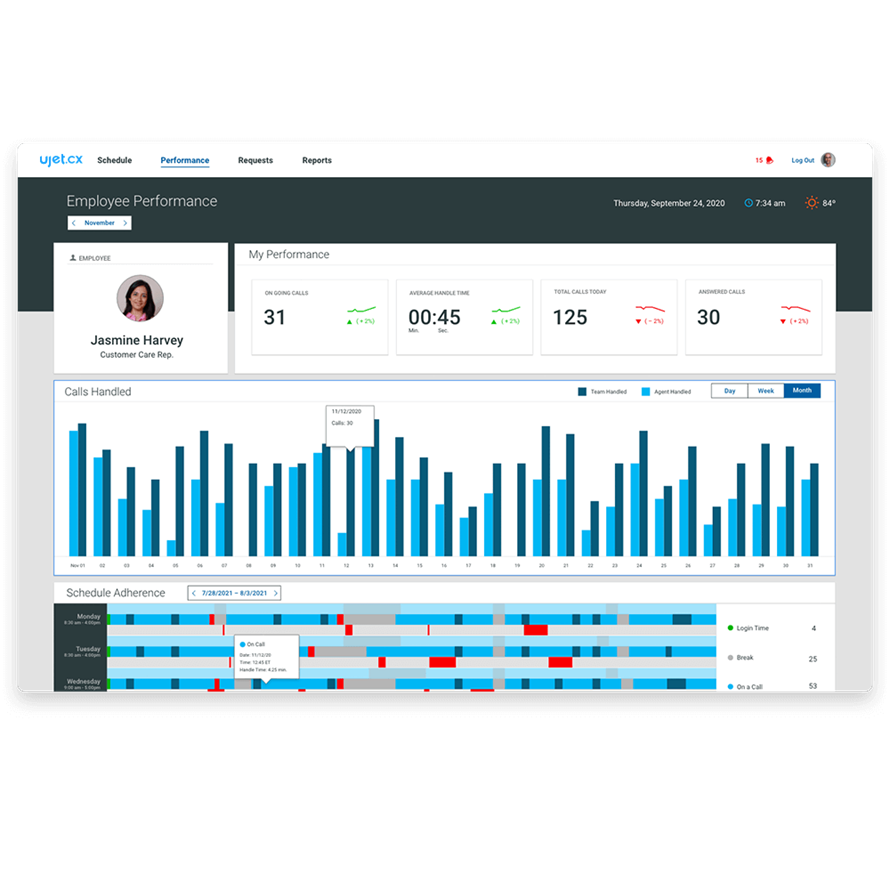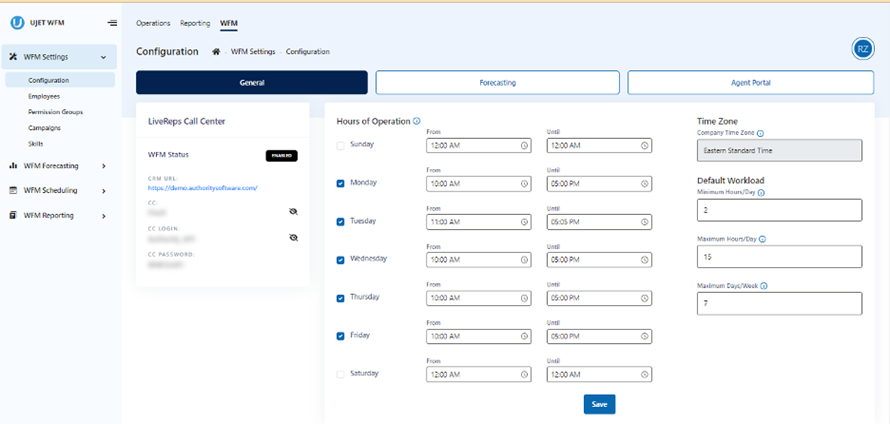UJET Workforce Management
Simple, Flexible Forecasting & Scheduling for the Modern Workforce
With remote and hybrid work becoming the new normal, managing contact center staffing has become more complicated than ever before. UJET Workforce Management (WFM) delivers simple, flexible, real-time forecasting, scheduling, and adherence monitoring, all on one easy-to-use and quick to deploy platform.

Intelligent, Flexible Forecasting
Quickly and easily create highly accurate omnichannel forecasts that model staffing requirements using both historical and real-time data. Unlimited interval, weekly, and monthly patterns and in-forecast updates provide day-to-day flexibility so you can make changes on the fly, or set it and forget it.
Dynamic Scheduling to Optimize Staffing
Save time by automating scheduling based on expected staffing needs, allowing agents to pick their schedule based on availability and skillset, or a combination of the two. UJET WFM is customizable and flexible so you can create schedules that account for agent skills, time zones, channel coverage, employee time-off requests, and more.

WFM Features
| Administration |
|---|
| Permission-based access |
| Connect employee details |
| Defines hours, locations, and time zones |
| Establish baseline forecasting levels |
| Set shift automation rules |
| Skills management |
| Forecasting |
|---|
| Group forecasts |
| Daily/weekly/monthly unlimited patterns |
| Forecast templates |
| Budgeting tools |
| In-forecast smoothing |
| Voice and omnichannel forecasting |
| Scheduling |
|---|
| Automated scheduling |
| Event scheduling |
| Accommodate flex, part time and full time agents |
| Scheduling templates |
| Self-service options |
| Portals |
|---|
| Schedules |
| Self-service options |
| Communication tools |
| Shift management tools |
| Approvals management |
| Real-time monitoring |
UJET WFM Benefits
Improve Agent Retention
UJET WFM delivers communication and self-service tools that make it easy for employees to interact with each other, select the shifts that work best for their availability and skills, submit requests for shift coverage, trades and time off, and see how they are progressing toward individual and team goals.
Make Smarter Decisions in Real Time
Get real-time visibility into customer service levels and agent performance with powerful advanced reporting features. UJET WFM makes it easy for managers and team leaders to respond to shifting trends in real time, minimizing over or under staffing, and ensuring the best possible customer experience.
Schedule Adherence Made Easy
UJET WFM helps you avoid costly mistakes by providing agents and supervisors with real-time access to adherence and performance monitoring to ensure that agents are in the right place at the right time, so there are no gaps in your customer service experience.
Learn More About Workforce Management
Frequently Asked Questions
What does WFM mean?
What does WFM mean?
WFM is an acronym for “workforce management.” Workforce management platforms are software solutions that help organizations create schedules, track employee time and attendance, and optimize staffing based on forecasted demand.
How do I know if I need WFM software?
How do I know if I need WFM software?
If your contact center is currently using spreadsheets or legacy WFM technology to schedule shifts and you struggle with time tracking, optimizing performance, performing payroll operations, or ensuring regulatory compliance, workforce management software could help your team reduce costs and work more efficiently. UJET WFM was designed to be affordable for organizations of all sizes, as well as those that are new to WFM software.
How can UJET WFM help my organization comply with Fair Labor Standards?
How can UJET WFM help my organization comply with Fair Labor Standards?
Workforce Management software helps companies follow local and national labor laws by automating processes and reducing the margin of error for scheduling and forecasting. UJET WFM can keep track of how many hours each agent is eligible to work, including overtime, if applicable.
How can WFM software help my company reduce costs?
How can WFM software help my company reduce costs?
Workforce management software offers features that include real-time tracking and historical reporting of employee time and attendance, activity, performance and productivity. Highly accurate tools allow for optimization of agent resources to minimize over or under staffing while meeting expected demand and contact center SLAs. WFM helps companies better understand and manage their workforce, measure the effectiveness of their resources, and make sure they are leveraging their workforce in an efficient manner.
In general, what ROI can contact centers expect from workforce management software?
In general, what ROI can contact centers expect from workforce management software?
Research by Nucleus found that workforce management solutions pay back an average of $12.24 for every dollar spent, with an average payback period of just under five months.



